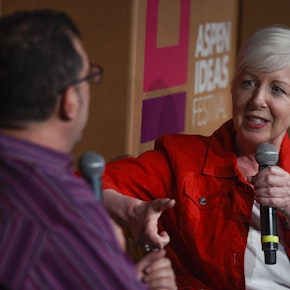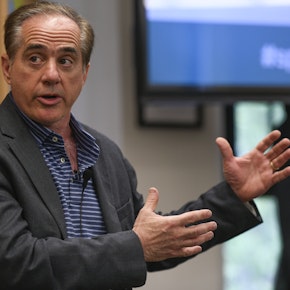Explore
Search results

White working-class voters without a college education are most vulnerable to diseases of despair — suicide, drug overdoses, and alcohol-related liver disease — and they are also most likely to have voted for President Trump. This population is deeply concerned about rising health care costs, according to focus groups conducted by the Kaiser Family Foundation, and more lik...

Health care never stops engendering political debate. Ten states have asked the federal government for the right to impose work requirements on some individuals receiving Medicaid, insurance premiums are expected to rise again this year, and the Affordable Care Act continues to provoke legislative and judicial action. How will all of that influence the upcoming election? L...

US Senator Mitch McConnell has just announced that he will bring health reform legislation to the Senate floor for a vote next week. What is actually proposed in this bill, which is designed to replace the Affordable Care Act (Obamacare) and has been crafted largely out of public view? And what does it mean for health care? Three top health reporters - Margot Sanger-Katz (...

Today, the US Supreme Court overturned the landmark Roe v. Wade decision, ending nearly 50 years of the constitutional right to abortion and sending the decision on whether to ban, restrict, or protect abortion back to the states. Public health and legal experts will discuss the implications of this controversial decision including how abortion access will change under sta...

Many experts argue that massive government mobilization on the scale of World War II deployment is needed to address the catastrophe of climate change. Such is the scope of the Green New Deal, a policy calling for 100 percent renewable energy by 2030, universal health care, living wages, and jobs guarantees. But some economists argue it could cost between $51 trillion and...

Regardless of the fate of the Affordable Care Act, the American health care system will continue to undergo an historic transformation, fueled by evolving science and technology, new approaches to reimbursement, restructured provider networks, and demographic shifts. The health policies of the future are likely to reflect the influences of both conservative and progressive...

In its landmark 2002 study, Unequal Treatment, the Institute of Medicine (IOM) stated bluntly that racial and ethnic minorities receive lower-quality health services than white Americans. Two decades after the IOM called out structural racism, the devastating toll remains apparent in the uneven risks associated with COVID, diabetes, asthma, cancer, stroke, and pregnancy. P...

The colorful story behind the latest energy bonanza in this red state is the story of entrepreneurs, environmentalists, ranchers, and politicians of all stripes who developed public policy that unleashed Texas’s renewable growth. Long known for oil and gas, Texas is dominated by a conservative legislature and governor’s office. But politics is local, business is business,...

The Veterans Health Administration, which serves nine million vets, has come under fire for long delays in providing services and reimbursing clinicians, and fixes are clearly needed. But former Department of Veterans Affairs Secretary David Shulkin got a lot of pushback when he argued against privatizing the $200 billion system. Everyone agrees that the veterans who sacri...

While the politics of gun reform remain divisive, many Americans are convinced that when it comes to gun violence, something has to change. Whether it’s getting more data about shootings, more background on buyers, or more resources to law enforcement to interrupt cycles of violence, there is a growing chorus of Americans demanding action. In the absence of congressional a...

Cities are responsible for 70 percent of global carbon emissions, and by 2050, two out of every three people will live in one. Fortunately, cities are getting serious about environmental footprint — New York announced its own Green New Deal, Melbourne aims to be carbon neutral by 2020, and Los Angeles will use 100 percent renewable energy by 2045. Mayors are often more nim...

As secretariat of the UN Framework Convention on Climate Change, Costa Rican diplomat Christiana Figueres led the global adoption of the Paris Agreement in 2015. But she was not always so hopeful, and recalls a turning point as she consciously shifted her attitude from despair to stubborn optimism. Jeff Goodell, author of The Water Will Come sits down with Figueres to reve...

From the skewed impact of climate change on the nations that have contributed least to the problem to financing mechanisms that allow primary care services to languish in the poorest countries, inequitable patterns in global health and development are all too evident. To radically reimagine healthcare systems, we need to acknowledge lingering colonialism and commit to exti...

The states shoulder a significant amount of responsibility for tackling the opioid epidemic, reversing obesity trends, and reducing tobacco use within their borders. They also have policy decisions to make about expanding Medicaid, developing health exchanges under the Affordable Care Act, serving undocumented residents, and strengthening their public health systems. Budge...

Mental health crises are plaguing Americans. Despite parity mandates that require mental health services to be reimbursed like any other medical service, clinician shortages, knowledge gaps, inequitable access to services, lack of culturally appropriate treatment models, and stigma combine to undermine effective care. To address the growing crisis, we need more research an...

Visionary leaders question established patterns, work collaboratively across disciplines and hierarchies, and trek fearlessly into uncharted territory. By encouraging risk-tasking, nurturing creativity, and championing unconventional thinking, they push the boundaries of what’s possible. Hear from a panel of trailblazers in health about what is required in a century that h...

Despite great differences in demographics, available resources, disease threats, and the structure of their health systems, all countries need responsive, equitable, and innovative policies to meet population needs. Leaders of national health agencies across the globe come together for a wide-ranging conversation that spotlights their unique and shared challenges and pione...

Structural racism, reflected in uneven access to care, inequitable community conditions, and the wealth gap, drives persisting racial disparities in health. Unconscionable differences in life expectancy and the incidence of numerous diseases are the result. The systems and structures at the root of these inequities were created intentionally and need to be dismantled just...

Being a parent is more challenging than ever. Workplace demands, the shortage of affordable daycare and paid leave policies, and the complexities of social media all put enormous strains on families. Yet parents have been left largely on their own to navigate the systems and build the structures their children need to thrive and often feel isolated and exhausted. Given the...

Two US Department of Agriculture Secretaries, one past, one present, come together to talk about American food policies. Agricultural supports and other decisions made on US soil, and the trade agreements we negotiate around the world, have powerful effects on the global food supply; land conservation; the use of water, nitrogen, and pesticides; and animal and plant diseas...

